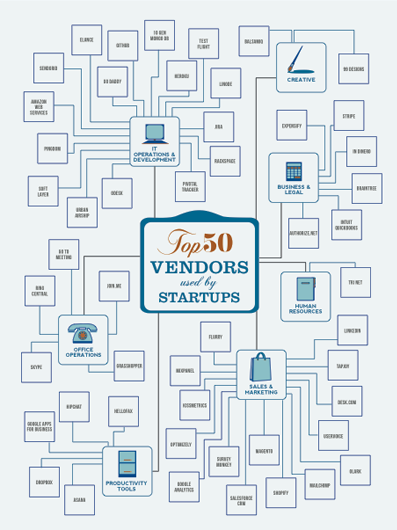The following is a guest post from fnBlog Contributor David Cheng, Co-Founder/CEO of VendorStack. This post, originally posted on the VendorStack blog, provides an inforgraphic of the top 50 vendors used by startups and a short discussion about vendors in the startup world.
Eight months ago, my cofounder Dallas and I embarked on a journey to find out who were the best enterprise vendors in the world and why people chose them. We started with a group of people we instinctively knew–startup founders. They say to build a product you would use and that’s what we did. Along the way, we began to accumulate a pretty good list of which vendors were used most by our entrepreneurial colleagues. For your enjoyment, here are the top 50 vendors used by startups.
We compiled this list after interviewing around 100 startup founders. The startups ranged greatly: some had 2 to 200+ person headcounts; others were in the consumer internet to medtech device spaces; we had startups from San Francisco to New York to London.
Our objective is to provide enterprise founders, executives, product managers, engineers, and looky-loos a quick cheat sheet on what vendors their peers have chosen with their budgets. Now, a few important disclaimers:
- Not perfect. Our objective was to present a good snapshot of what was popular within the startup community. As we expand our data set, we expect this list to become increasingly comprehensive and accurate. If you are a vendor and you feel like you’ve been slighted by our list, apologies from the VendorStack team. Please contact us at vendors@vendorstack.com and we’ll get back to you shortly. Thanks!
- West coast bias. We’re based out of San Francisco, CA and many of the startups we talked to were down the street. With this geographic proximity, the results were also skewed towards SF Bay Area vendors, particularly those who are backed by some of the more popular incubators like YCombinator, 500 Startups, and AngelPad.
- Missing some categories. We realized as we were interviewing the startups that law firms, for example, while an important and expensive vendor for all startups, were not particularly diverse in its variety. For this reason, we took lawyers off this infographic (although they are all found on vendorstack.com). We also took out payroll providers and banks for the same reason.
So what did we learn? Perhaps the most surprising thing is that there are not that many surprises. Within many of the major categories, there was a clear winner. For example, the 10 most popular vendors (sorted alphabetically) were:
- Amazon Web Services
- Dropbox
- Github
- GoDaddy
- Google Analytics
- Google Apps for Business
- Heroku
- Intuit Quickbooks
- Mailchimp
- Salesforce CRM
Each of these vendors/products destroyed their competition. That isn’t to say there wasn’t some contention in some of the more popular vendor categories. For example, we had five highly competitive vendor categories:
Analytics: Google Analytics, KISSmetrics, Mixpanel, and Optimizely ruled the day when it came to online analytics. Practically everyone used Google Analytics (because it was free) and the users of KISSmetrics, Mixpanel, and Optimizely were more evenly mixed. Flurry was the only mobile analytics provider that cracked the top 50 and they had a compelling lead compared to other mobile-only providers.
Hosting: Everyone needs hosting so it’s no surprise that hosting was competitive. Besides Amazon Web Services, we also had a lot of users for Linode, Rackspace, and Softlayer.
Live Chat / Customer Service: Maybe the biggest surprise was how popular these services have become over the past year. Desk.com, Olark, and UserVoice ruled these categories. Talking to Richard White at UserVoice, he articulated that their viral nature is inherent in its ubiquity; they’re literally on every page and it says “Powered by ______”.
Payment Processing: For those startups in the e-commerce space, payment processing is a particular brand of headache. For this reason, the stalwart Authorize.net has been able to compete with up-and-coming Braintree and Stripe.
Project / Task Management: Teams need tools to be productive, and we uncovered that Asana, JIRA, and Pivotal Tracker were leaders in the pack. There are some nuances here. More technical oriented teams preferred JIRA and Pivotal Tracker over more broadly defined Asana.
We want to continue making lists for you guys so please sign up for a closed beta invite on vendorstack.com. Thanks!
Want to learn more about @VendorStack? connect with David on Twitter @DavidPCheng







